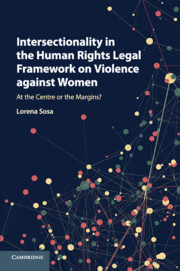 Intersectionality in the Human Rights Legal Framework on Violence against Women
Intersectionality in the Human Rights Legal Framework on Violence against Women Book contents
- Frontmatter
- Contents
- Figures
- Acknowledgements
- Acronyms
- I Introduction
- II Intersectionality in Law
- 3 The Human Rights Framework on Violence against Women
- 4 Intersectionality in the United Nations
- 5 Intersectionality in the Council of Europe and Inter-American System
- III Intersectionality in Practice
- IV Conclusion
- Bibliography
- Index
4 - Intersectionality in the United Nations
from II - Intersectionality in Law
Published online by Cambridge University Press: 25 October 2017
- Frontmatter
- Contents
- Figures
- Acknowledgements
- Acronyms
- I Introduction
- II Intersectionality in Law
- 3 The Human Rights Framework on Violence against Women
- 4 Intersectionality in the United Nations
- 5 Intersectionality in the Council of Europe and Inter-American System
- III Intersectionality in Practice
- IV Conclusion
- Bibliography
- Index
Summary
The problem, then, is not one of missing norms, but one of missing interpretations.
Margaret SatterthwaiteIntroduction
This chapter explores the human rights documents on Violence against Women (VAW) adopted at the United Nations (UN) and the derived duties of States from an ‘intersectional approach’.
At the time of writing, the UN has not adopted any international binding convention or treaty dealing with VAW specifically, yet several norms of the Convention on the Elimination of All Forms of Discrimination against Women (CEDAW) are applicable to VAW. These have been confirmed and elaborated upon by the UN Committee on the Elimination of Discrimination Against Women (CEDAW Cee). The United Nations General Assembly (UNGA) has also taken an interest in VAW and contributed to the elaboration of a comprehensive applicable framework. In addition, several International Human Rights Conferences have contributed both directly and indirectly to the framework as well. Finally, some additional United Nations’ bodies produce reports and documents which provide crucial information to bodies engaged in the elaboration of human rights norms on VAW. This is the case of the United Nations Secretary General (UN SG) and the United Nations Special Rapporteur on Violence Against Women (UN SRVAW). The most relevant work of these two bodies is included in the analysis in order to provide the reader with some sort of travaux préparatoires of the current applicable framework.
The final text of the CEDAW, adopted in 1979, did not explicitly require States to eliminate VAW. Only trafficking in women and exploitation of prostitution were included as a violation of women's human rights in Article 6. Consequently, awareness raising and lobbying of feminist scholars and women's movements for the explicit inclusion of other forms of VAW within the international human rights framework continued for decades.
Article 17 of the Convention established the UN Committee on the Elimination of Discrimination Against Women (CEDAW Cee), in charge of monitoring its domestic implementation. One of the tasks of the Committee is to interpret the Convention by issuing General Recommendations (GRs), which guide State parties in the mandated reporting process.
- Type
- Chapter
- Information
- Intersectionality in the Human Rights Legal Framework on Violence against WomenAt the Centre or the Margins?, pp. 61 - 120Publisher: Cambridge University PressPrint publication year: 2017
- 2
- Cited by


